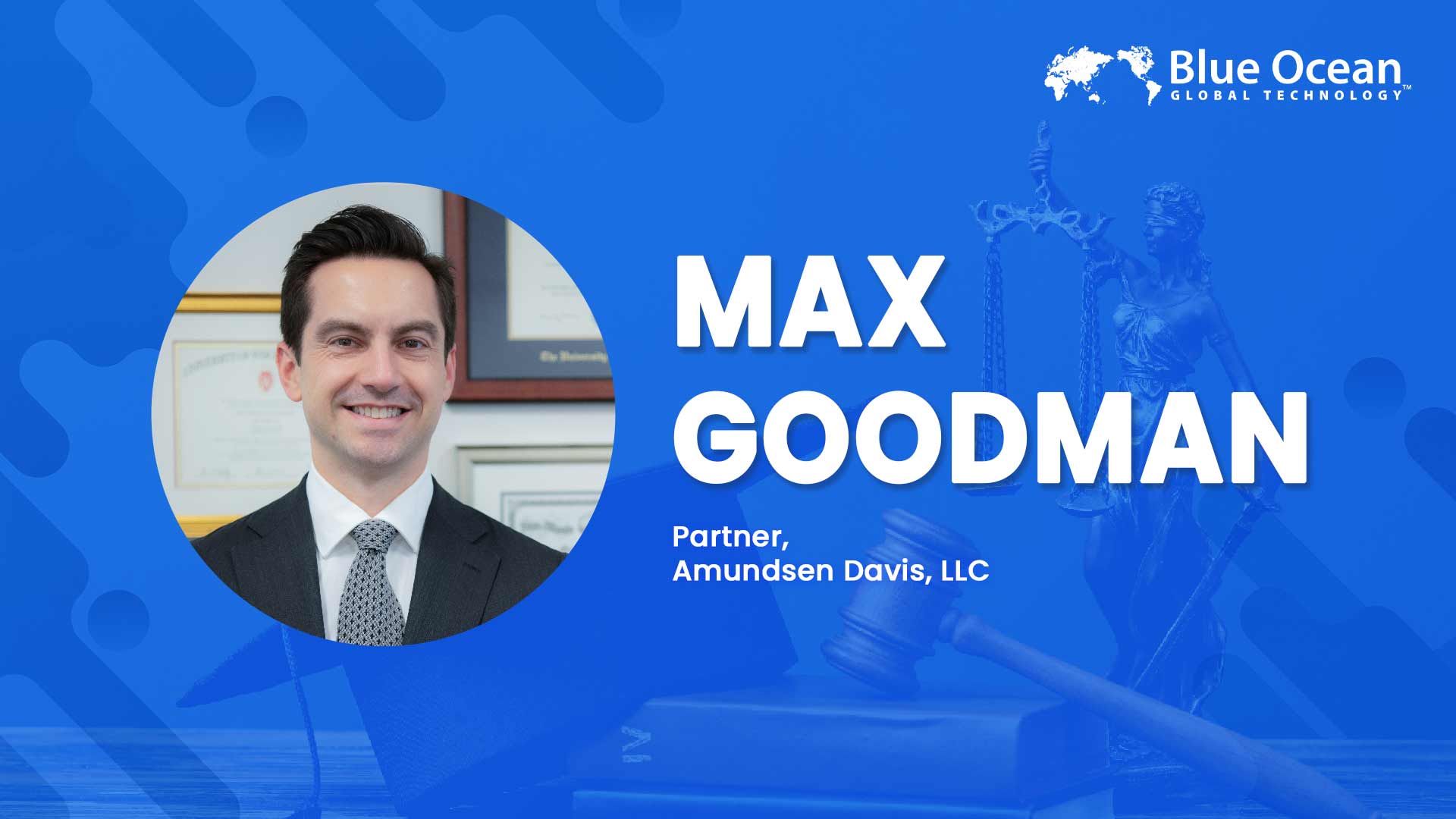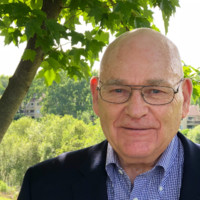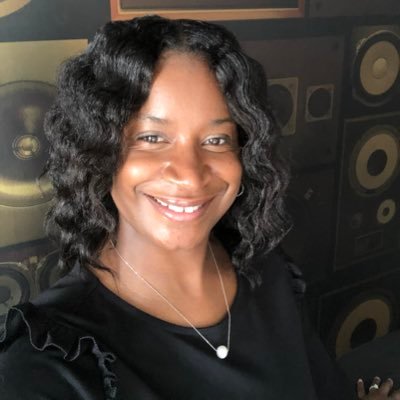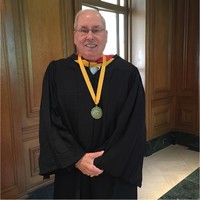About Max Goodman

Max Goodman is a Partner at Amundsen Davis’ Fitness & Wellness Services, Commercial Litigation, and Media & Hospitality groups. His debut closing argument before a jury resulted in a complete defense verdict in a week-long, multi-million dollar trial—a pivotal moment that he considers among the highlights of his career. Max’s dedication, strategic acumen, and meticulous approach consistently secure significant victories for his clients. As a member of Amundsen Davis’ Business Litigation Service Group, Max adeptly handles cases involving breach of contract, unjust enrichment, fraud, and tortious interference. He defends restaurant and hospitality groups, media clients facing defamation and false light claims, and businesses in the health, wellness, and fitness industry. A member of the Illinois State Bar, Max has been recognized on the Illinois Super Lawyers “Rising Stars” list from 2020 to 2024.
Blue Ocean: Tell us about yourself.
Max Goodman: I grew up in the Chicago area and attended college at the University of Michigan, and later the University of Wisconsin Law School. I am currently a defamation attorney and partner at Amundsen Davis in Chicago. Our team specializes in defamation law – more specifically, internet and social media defamation.
Blue Ocean: Tell us about your professional life and what inspired you to pursue law.
Max Goodman: I was inspired to pursue law by my college roommate’s older brother who was at the University of Michigan Law School while I was an undergrad. I volunteered as a juror for one of his mock trials and the experience left an impact on me. At the time, those law students were only a few years older than me but they looked like pros. The prospect of becoming an attorney was invigorating and the competitive nature appealed to me. Sports was a large part of my childhood, so this felt like a natural extension. I was always drawn to be a litigator, and that’s what I am today.
Being an attorney is about simplifying complex problems. We’ll routinely take two years’ worth of documents produced in a case — maybe 50,000 documents — summarize them, develop a theme for the case, and explain our side’s position to a jury in a persuasive, understandable way. It is an incredibly rewarding experience seeing a jury nod along in agreement as you make critical points. Not all attorneys love what they do but this is right for me.
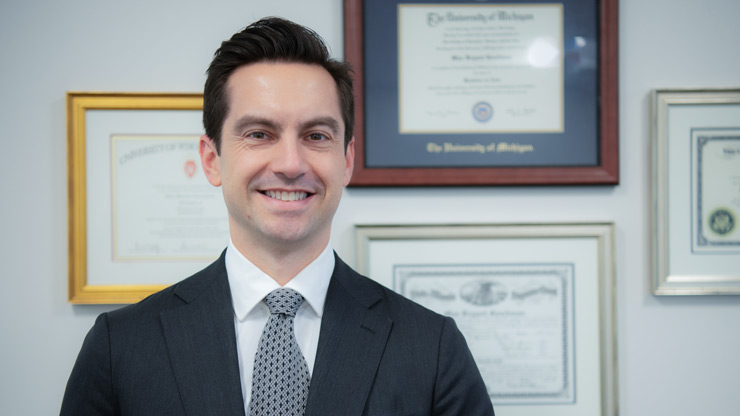
Blue Ocean: What does a typical day in your life look like?
Max Goodman: My day starts playing with our eleven-month-old daughter. She’s our first. Once our kid is set, work begins. First, I prepare for and attend court appearances to move matters along, and then try to tackle at least one or two major issues in our cases each day. That might include completing a significant motion, putting the final touches on an upcoming argument, or having a difficult conversation with a client or opposing counsel. Incremental steps taken in a given day do not always feel monumental for a particular case but those steps accumulate and result in great progress (and results) for our clients.
Blue Ocean: Is there an industry trend that you like or are excited about?
Max Goodman: One industry trend that I find particularly intriguing and am excited about is the heightened recognition of the impact of online statements. Contrary to the adage of “sticks and stones,” there is an increasing acknowledgment that what people say or write about you on platforms like LinkedIn, Facebook, Instagram, or Twitter is of consequence. In the past, rumor or gossip might have circulated in a local town square or during a political campaign — limited reach and impact. Now, a well-crafted, entertaining, or shocking lie can instantly reach millions and it’s documented on the internet forever to essentially be repeated with every search of your name.
Online publications of offending speech now regularly causes people to lose their jobs or relationships, ruining reputations. Courts and legal professionals are increasingly recognizing the significance of these online interactions and adapting to these unique challenges.
Another trend in the legal industry is better integration of technology in law firms. While flashy topics like AI and ChatGPT capture attention (and seem to have some applications to law firms), there is also a broader transformation in the way technology is streamlining legal processes. Law firms used to have full libraries to research cases — that is now all digital of course. Computers and better software have enabled one legal assistant to support multiple attorneys efficiently, lowering legal costs. We are seeing similar technological leaps enabling firms to make legal services more accessible to a wider audience beyond large businesses. Firms embracing those developments is exciting.
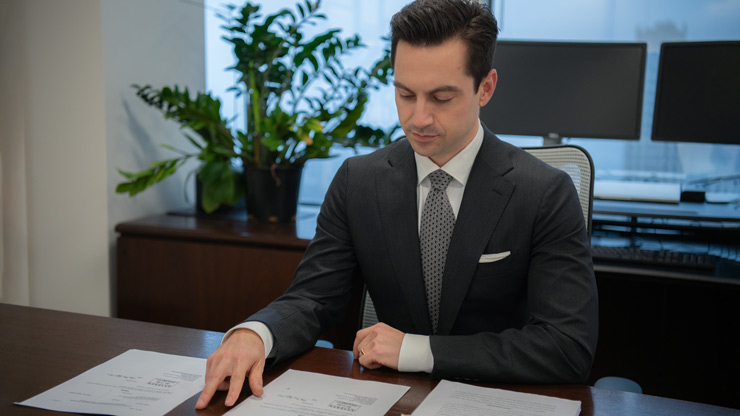
Blue Ocean: How have you differentiated yourself and what underpins your success in your practice?
Max Goodman: Our team’s deep understanding and experience with online defamation law is something that sets us apart from most. Defamation law involves numerous defenses, privileges, and the context of the given speech. Understanding how to effectively have damaging posts removed by large tech companies quickly is critical. Many attorneys attempt to navigate these areas casually, but without experience, it is challenging.
Our response to these emerging trends was not necessarily planned years ago but rather, it was a response to changing client needs. Over the past five or so years, our team has honed a strategic response, starting usually with a phone call (or a more formal letter) to the bad actor, attempting negotiations before resorting to litigation and navigating the intricacies of dealing with tech companies for necessary information. Subpoenas to discover information allow us to bypass uncooperative opposing parties. Filing as a “John Doe” helps preserve our client’s reputation. Our process, refined through multiple successful matters, has allowed us to continuously enhance our approach to better serve our clients. When clients engage us, they appreciate the structured game plan.
Our team also frequently writes about online defamation, our strategies (no need to hide the ball), interesting cases in this area, and discovery tools/processes. Our audience includes lawyers facing these legal issues in their cases but also those who were either defamed or falsely accused of defaming someone else. By sharing particular problems we’ve encountered (while maintaining client confidence), we provide a resource for individuals facing similar challenges.
Blue Ocean: What is something unique you offer to your clients?
Max Goodman: We spend a lot of time understanding the client’s true goal to make sure we’re working toward it. What challenges are keeping them up at night — what else is going on with their business or their lives that impacts this case and the preferred outcome?
The goal is not always filing a lawsuit or winning at trial (even if a client may talk a big game at first). Spending time outlining the years it takes to litigate a case, the stress of depositions and trial, the discovery’s invasiveness, and, of course, the cost is important to making sure the client is proceeding with eyes wide open. Their true goal may be minimizing negative publicity, and lessening exposure. Perhaps they need the litigation (or the threat of litigation) to be resolved quickly so they can more easily sell their business, or they want a written, public apology from the other side. Litigation can be a tool to accomplish those larger goals but it is not the goal.
Blue Ocean: What advice would you give your younger self or other people aspiring to be a lawyer?
Max Goodman: I would emphasize the importance of gaining a thorough understanding of the specific area of law they choose to practice. In litigation, for instance, the core of our profession is problem-solving, simplifying the complex, and telling that story. If that’s not interesting to you, then maybe litigation isn’t your path.
A piece of advice to young attorneys would be to diversify your experience by handling a variety of cases early on. This exposure not only helps you find what area of law you love but also equips you with a broader perspective that can prove invaluable in future cases.
As in most jobs, young attorneys have to work a lot of hours when starting. There is a steep learning curve so getting through those 10,000 hours quickly will make you more valuable to your team. It’s also more fun when can see the bigger picture of a case (and how your work that day fits into that picture) rather than just handling one-off assignments on a matter seemingly without purpose.
Blue Ocean: What is something you are grateful for?
Max Goodman: Professionally, I’m grateful for the mentors at my firm who invested time in me. We’ve built a great team and I hope I can pay them back.
Personally, becoming a new father has deepened my appreciation for my parents. Having a child allowed me to see my parents in a new light, fostering a deeper understanding of how they view me, somehow, in how I see our daughter. Overall, the degree to which I’ve come to appreciate family and what that concept means has expanded significantly.
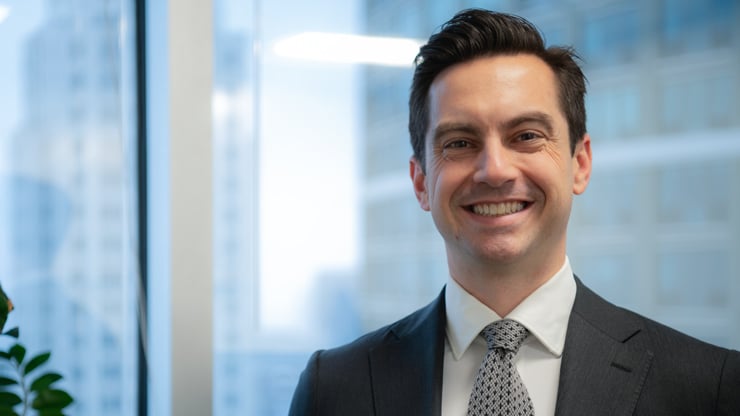
Blue Ocean: What are your sources of inspiration?
Max Goodman: My father. As a doctor, his work ethic and accomplishments throughout his career have been an amazing model for me. I like how he listens when I speak about a particular challenge at work, sharing suggestions on handling matters or recounting relevant stories.
His genuine listening ability is something else. Many merely wait for their chance to speak — in contrast, my father fully engages with what the other person is saying. I think about that quality —that patience— a lot. This trait is particularly valuable to a litigator, where asserting one’s viewpoint is crucial but listening (for example, at depositions or a hearing) is often more important. Effective problem-solving involves thoroughly understanding the opposing side’s position—listening, confirming we understand their points, and identifying areas of agreement and disagreement. I think my father would have made a great lawyer.
Blue Ocean: Outside of work, what passions or interests do you have?
Max Goodman: I enjoy traveling. Planning trips with my wife and family adds an extra layer of excitement to the experience. Our bonding revolves around shared meals, so everyone can have their vacation but then come together each day. For us, travel is not just about visiting new places; it’s about spending dedicated quality time with family.
Travel aside, witnessing my daughter’s first experiences in the world has become a source of daily immense joy. She’s into baby gymnastics now — it’s very fun.
Blue Ocean: What is your favorite quote?
Max Goodman: “A fool pulls the leaves, a brute chops the trunk, but a sage digs the roots.” It is a quote about strategy — looking past a quick response or action that may be emotionally rewarding but ultimately, inconsequential. In our cases, repairing one’s reputation involves thoroughly disproving a lie (leaving no doubt) — this process often begins with a trial victory or favorable settlement, obtaining an admission from the opposing side that their statements were false, and repeatedly telling that story.
Subsequently, a comprehensive strategy, yes, often involving a company like Blue Ocean, is employed to counteract the negative impact online. This includes public statements and interviews that persuasively demonstrate the truth and restore the individual’s reputation.
Do you have a personal or professional story that can inspire other people into becoming the best version of themselves?
You are welcome to share your journey with our audience.

